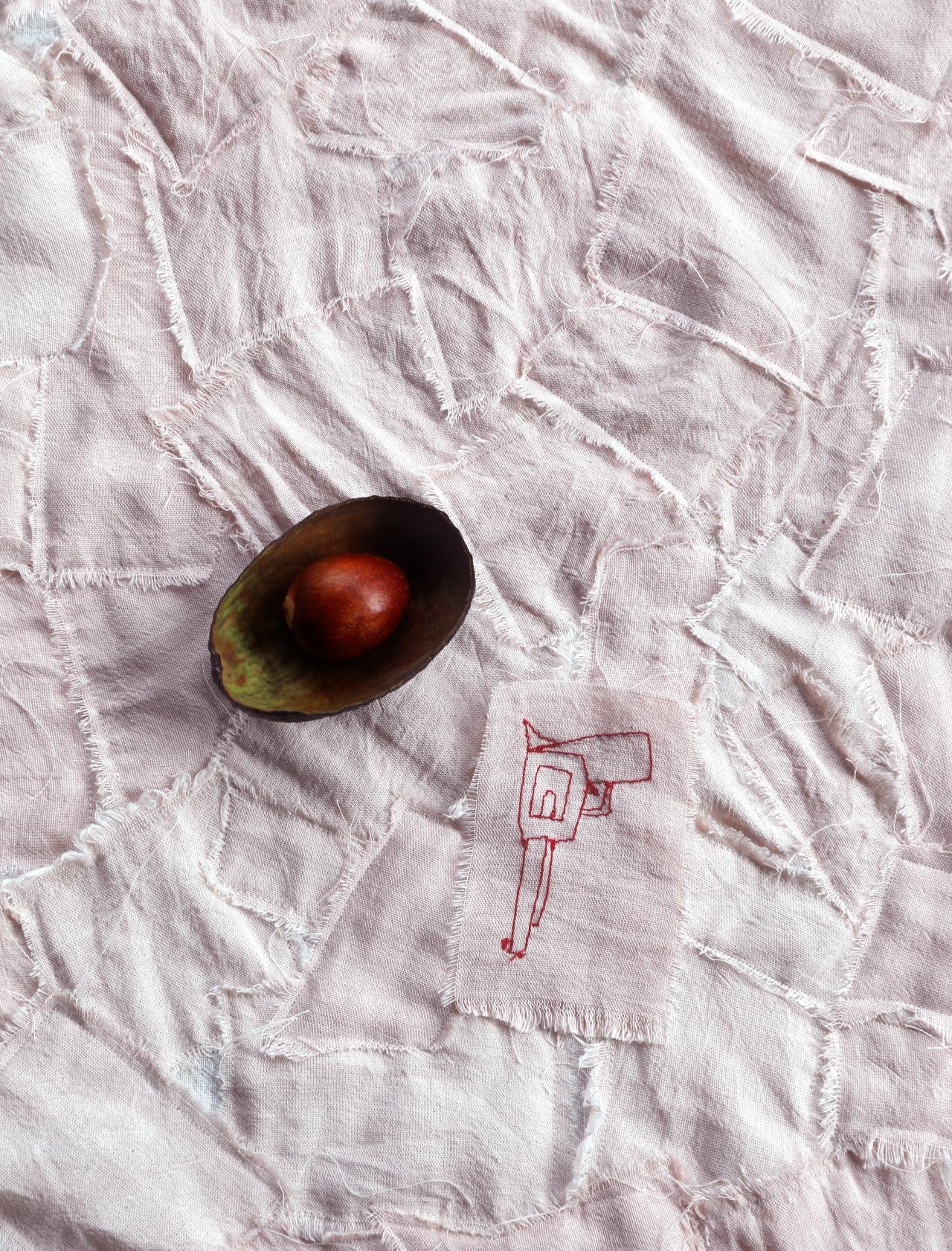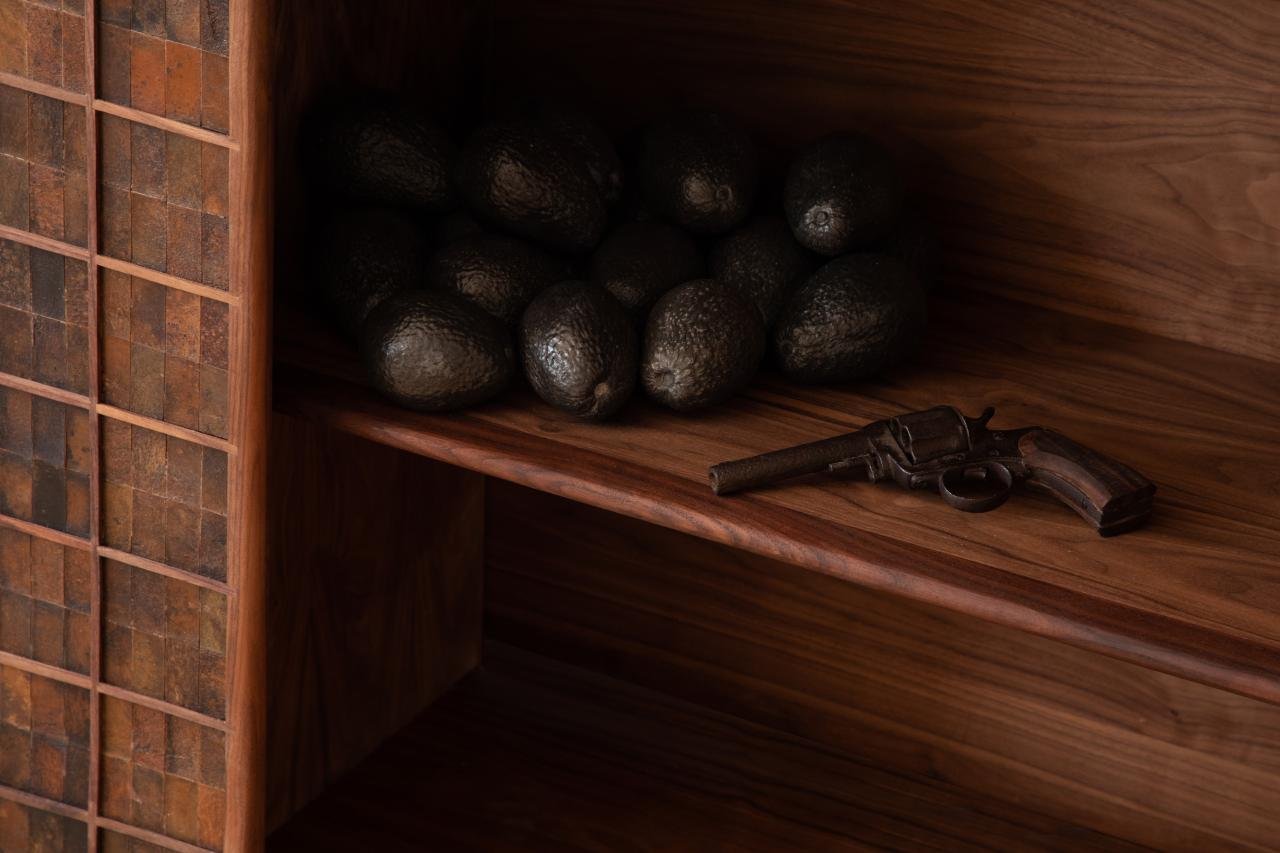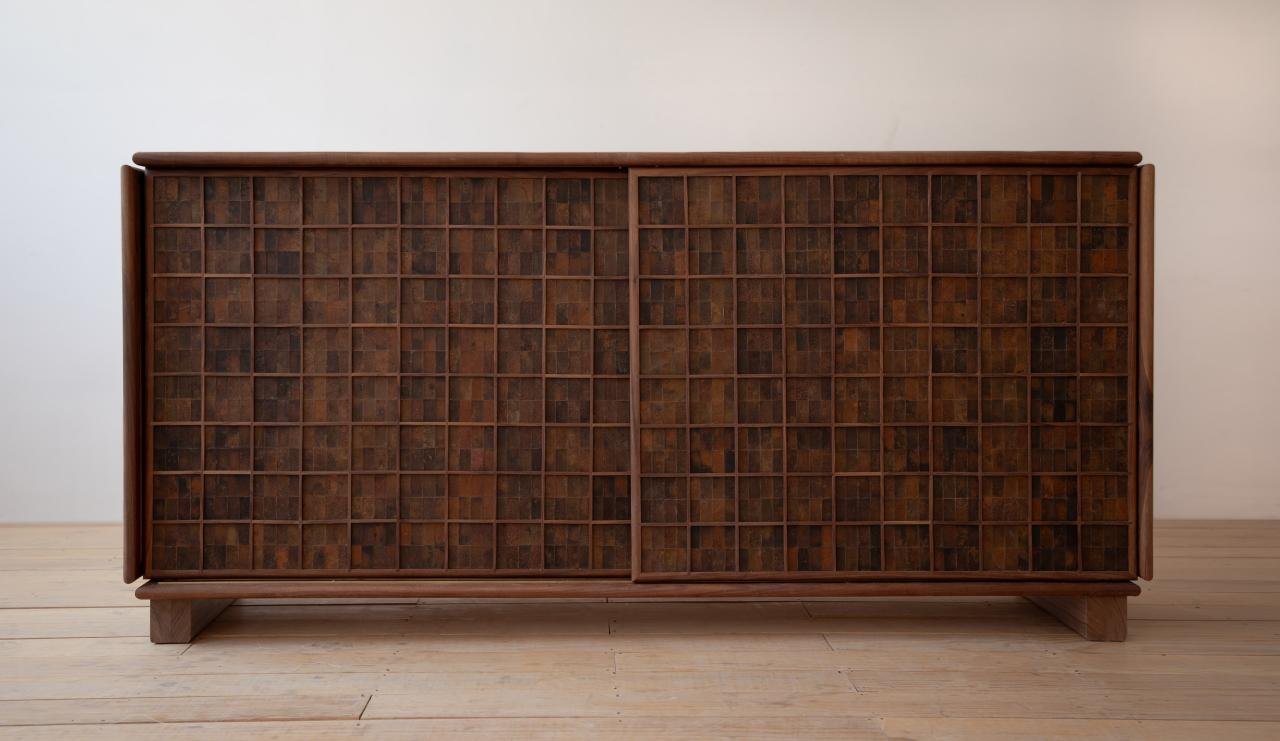Avocado Impact Unveiled: Fernando Laposse Merges Design and Activism
Fernando Laposse’s work Conflict Avocados on display in NGV Triennial at NGV International, Melbourne. Photo: Sean Fennessy
In our industrialized societies, we find ourselves physically and emotionally detached from producing food and raw materials. The paths of global trade, often not apparent, significantly shape our lives through agricultural products and natural raw materials, which go beyond simple commodity status. These items have rich histories and are deeply influenced by the socio-economic conditions under which they are produced. Their production impacts biodiversity, ecosystems, and the well-being of the communities involved. While global trade brings us closer by making diverse products accessible, it frequently masks the true nature of how these items are produced. This often leads to exploitation and environmental harm, as the complexities and realities of production remain hidden behind the convenience and accessibility of global markets.
Fernando Laposse, a Mexican designer, masterfully explores these complex stories through his designs. Interrogating the networked origins of materials, he reinterprets traditional methods and techniques to communicate their origins' historical and cultural conditions. Combining traditional techniques with contemporary innovation, Laposse collaborates with local artisans, focusing on indigenous Mexican plants like agave, sisal, and corn. His creative endeavours advocate for sustainable and regenerative practices and conscious consumption.
Fernando Laposse’s work Conflict Avocados on display in NGV Triennial at NGV International, Melbourne. Photo: Sean Fennessy
Laposse's 2023 project, 'Conflict Avocados,' showcased at the NGV Triennial at the National Gallery of Victoria in Melbourne, Australia, is a comprehensive exploration combining design and material research. This project questions the recent history and the consequential impact of the rapid growth of the avocado industry. Encompassing furniture, tapestry, and a documentary, the project employs various media to bring attention to Mexico's avocado sector's human and ecological victims.
Traditionally, avocados have been sustainably farmed, but due to the surge in international demand, primarily from the US and Europe, farming practices have undergone significant changes. These changes have resulted in environmental degradation, social unrest, and escalated violence, especially in Michoacán, the epicentre of avocado exports. Here, criminal organizations exploit the lucrative avocado trade through illegal activities like logging and land grabbing, leading to the classification of avocados as a 'conflict commodity.'
Michoacán now confronts severe environmental and social challenges due to the expansion of the avocado industry. Deforestation, a primary concern linked to avocado cultivation, threatens local biodiversity and water resources, with estimates indicating that 30 to 40 per cent of deforestation in the region is associated with avocado farming. The Monarch Butterfly Biosphere Reserve, a protected area, also faces threats from the growing avocado plantations, risking the region's ecological balance.
Initially inspired to address the effects of deforestation on butterflies through conversations with Homero Gómez González, a guardian of the Monarch Butterfly Sanctuary, Laposse's focus shifted following González's disappearance and presumed murder in 2020. This incident redirected Laposse to the human cost associated with the avocado industry in Michoacan.
Fernando Laposse’s work Conflict Avocados on display in NGV Triennial at NGV International, Melbourne.
'Conflict Avocados' articulates the global and interconnected nature of the avocado trade, highlighting its scale, industry impacts, and the significant effect on local communities and ecosystems in Michoacán. Laposse's pieces, including a 40-meter-long handmade tapestry dyed with avocado and embroidery and a cabinet made from avocado skin, serve as a memorial to the human victims of the region's violence. These works symbolize a place of rest and reflection, embodying Laposse's intention to recognize and commemorate the ongoing struggles and losses in the area. For the 'Avocado Leather Cabinet,' Laposse innovated a new technique for processing avocado skins into durable, finished marquetry. This approach ensures the marquetry's scale directly relates to the material properties, emphasizing Laposse's commitment to making the origins of these materials evident and integral to his design.
Fernando Laposse’s work Conflict Avocados on display in NGV Triennial at NGV International, Melbourne. Photo: Sean Fennessy
In conclusion, Fernando Laposse's work represents a profound intersection of art, design, and social activism, offering a critical lens through which to view our globalized world. His exploration into the deep-seated stories of agricultural products and natural raw materials unveils the often unseen socio-economic dynamics that shape their existence. Through his innovative designs, Laposse resurrects traditional methods and local wisdom, imbuing them with new life and relevance in contemporary contexts.
By bridging the gap between consumers and the origins of the products they consume, Laposse's creations challenge viewers to reconsider their role in the global economy and the impact of their consumption habits.
Laposse's artistic narrative weaves a poignant story of connection and disconnection, highlighting the urgent need for sustainability and ethical responsibility in our consumption patterns. His work is a testament to the power of design as a tool for social change, encouraging us to rethink our relationship with the natural world and the communities that nurture it.
Info
Fernando Laposse
NGV Triennial at the National Gallery of Victoria in Melbourne, Australia
3 DEC 23 – 7 APR 24
https://www.ngv.vic.gov.au/triennial/artists-designers/fernando-laposse/
https://www.ngv.vic.gov.au/essay/grafting-shadows/
Photography
By Sean Fennessy
Fernando Laposse The avocado legacy. Deforestation, revolution, a new beginning 2023, from the Conflict Avocados project 2023, National Gallery of Victoria, Melbourne. Commissioned by the National Gallery of Victoria, Melbourne. Purchased with funds donated by The Andrew and Geraldine Buxton Foundation, 2023. This artist has been supported by the Elizabeth Summons Grant in Memory of Nicholas Draffin. This project is proudly supported by Mercedes-Benz
© Fernando Laposse
Sources
https://www.wri.org/insights/will-mexicos-growing-avocado-industry-harm-its-forests
https://cri.org/mexico-avocados-export-fueling-deforstation-abuse/
https://cri.org/reports/unholy-guacamole/
https://whc.unesco.org/en/list/1290/
WORDS
Nina Zulian





